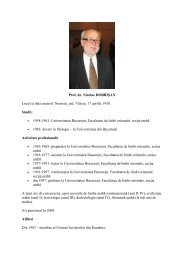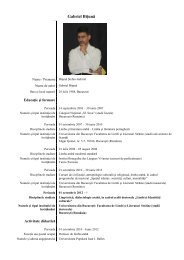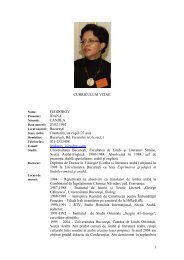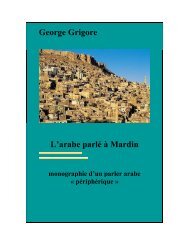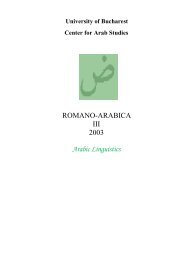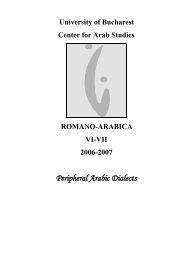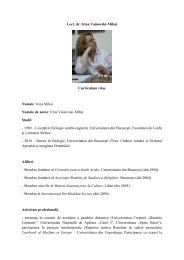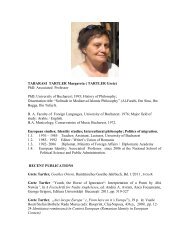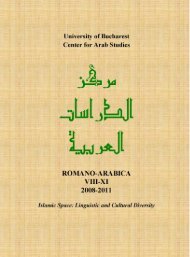12 55 Years of Arab Studies in Romania - Secţia de Arabă
12 55 Years of Arab Studies in Romania - Secţia de Arabă
12 55 Years of Arab Studies in Romania - Secţia de Arabă
You also want an ePaper? Increase the reach of your titles
YUMPU automatically turns print PDFs into web optimized ePapers that Google loves.
Examples: láh ( = lā ) mā ḫabbértniš c ánnu „No, you didn’t tell me<br />
anyth<strong>in</strong>g about him.”<br />
lâh lâh mā qẹlnâ-lak mbâręḥ lâh „No, no we didn’t tell you yesterday.<br />
(Feghali, 1928: 218).<br />
In some cases, the particle lā doesn’t negate the nom<strong>in</strong>al clauses that is<br />
preced<strong>in</strong>g, but negates an action or someth<strong>in</strong>g that already occurred.<br />
Examples: qālét-lé dáḫlak 'aḷḷā bīqāṣéṣnė qẹlt-éllā lā 'áḷḷa γfûr. „She told<br />
me: Do you th<strong>in</strong>k God will punish me? I told her: No, God is merciful.”<br />
ḫáįyak ba c du nâyęm lā qâm mẹn zmân. „Your brother is still sleep<strong>in</strong>g? No,<br />
he woke up a while ago.” (Feghali, 1928: 219).<br />
1.2. Particle mā<br />
The particle mā is very used <strong>in</strong> Lebanon, it can be heard both before an<br />
imperfective verb and before a perfective one. Thus, it can negate both a past<br />
action, a present one or a future one. Furthermore, the particle mā can be<br />
comb<strong>in</strong>ed with suffix pronouns reveal<strong>in</strong>g quasi-verbal traits and express<strong>in</strong>g, <strong>in</strong> the<br />
Lebanese dialect, the verb “to be” at its negative form. But, contrary to the<br />
synonym particle lā, mā can never be jo<strong>in</strong>ed directly to a pronoun. Subsenquently,<br />
we can say that mā is ma<strong>in</strong>ly a verbal particle, whilst lā is a nom<strong>in</strong>al one. For this<br />
reason, the negative element š(i) 4 , which is usually attached to a negated verb,<br />
cannot appear along with a verb prece<strong>de</strong>d by the particle lā, the only exception to<br />
this be<strong>in</strong>g the verbs at the imperative mood: lā tǧîš “don’t come”. However, the<br />
particle lā <strong>in</strong> most mo<strong>de</strong>rn dialects is replaced by mā, even <strong>in</strong> the case <strong>of</strong> a verb at<br />
the negative imperative. (Feghali, 1928: 220)<br />
As shown above, the particle mā prece<strong>de</strong>s an imperfective or a perfective<br />
verb to negate the action expressed by it, the verb, <strong>in</strong> its turn, is sometimes<br />
followed by the adverb š(i):<br />
'ánā mā c am bḥǟkîk. „I’m not speak<strong>in</strong>g to you.”<br />
mā 'ékęl ḫόbz ulā tîn. „He doesn’t eat nor bread, nor figs.”<br />
mā šefnákš. „I didn’t see you for a while.” (Feghali, 1928: 221).<br />
Often, the first phonetic element <strong>of</strong> mā disappears as a consequence <strong>of</strong> a<br />
dissimilation, un<strong>de</strong>r the <strong>in</strong>fluence <strong>of</strong> another labial consonant, b or m:<br />
qâl 'a będduš iǧí. „It seemed like he didn’t want to come.”<br />
4 Inhabitants <strong>of</strong> big cities, such as Beirut, along with most <strong>of</strong> the educated people avoid us<strong>in</strong>g the<br />
element š(i), that they f<strong>in</strong>d particularly vulgar and characteristic to the <strong>in</strong>habitants <strong>of</strong> the mounta<strong>in</strong><br />
regions and for the fẹllâḥ. (Feghali, 1928: 221)<br />
21



